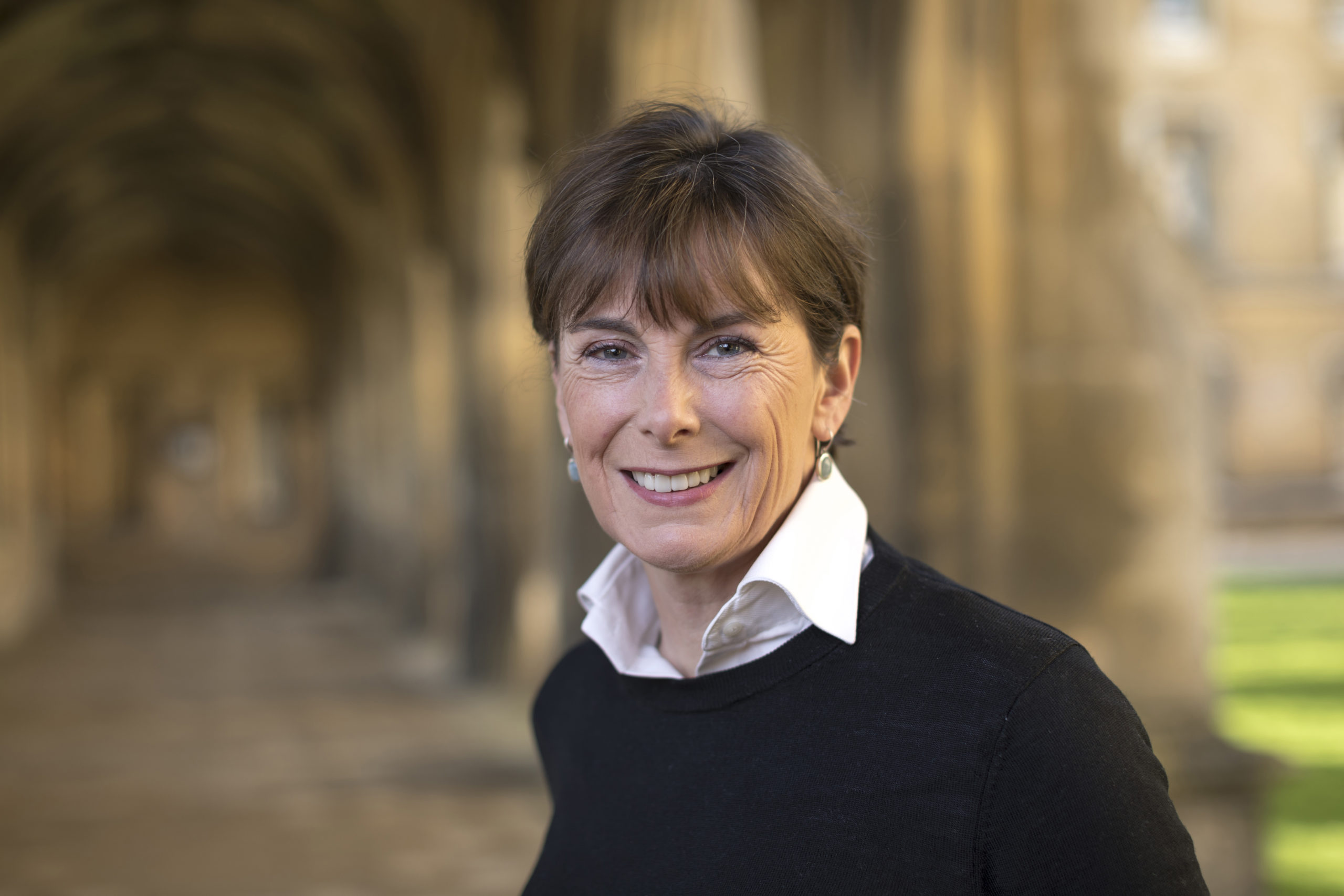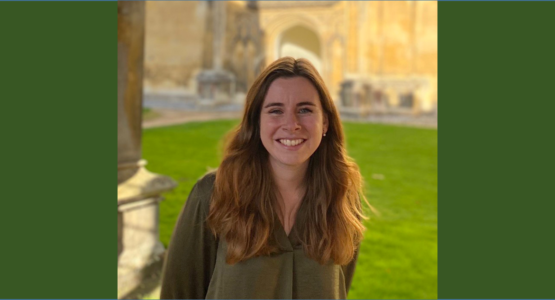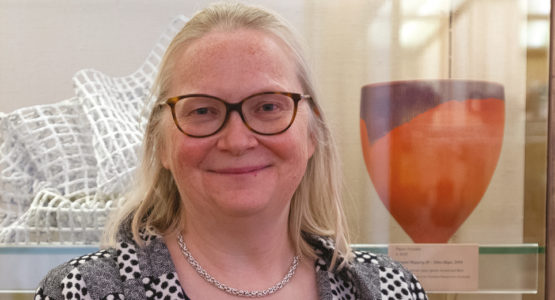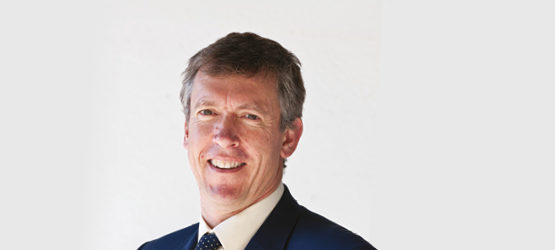Johnian magazine issue 48, spring 2022
Setting the post-pandemic direction
As we begin to emerge from the challenges posed by the Covid-19 pandemic, Heather Hancock (1984) reflects on the fortitude and spirit of the Johnian community and shares her hopes and ambitions for the College’s future.
Firstly, how have you found your time as Master of St John’s so far?
My overriding feeling is of incredible pride in the College – everyone coped so well with the succession of Covid-related challenges. We kept teaching and learning going on in person as much as we possibly could, there was immense care shown for our students, staff and Fellows, and everyone showed an impressive commitment to sustaining the wider life of College, even if it took some re-imagining.
I wanted the 2020/21 academic year to end on a high note after so many dark days. Our Summer Feasts and entertainment – one for each student year group – were a great success. It meant that our students left Cambridge in the summer with a happy shared memory of a landmark event, something that just hadn’t been possible for the last 15 months.
It wasn’t all about tackling the pandemic. The launch of our free places ambition was a standout moment. We appointed a highly respected new Senior Tutor. By July, right on target, the Buttery/Bar/Café redevelopment started on site. Our alumni and donors were a source of great support – I cannot thank them enough. Without spoiling future surprises, we will soon announce exciting and ambitious enhancements of the College, with big benefits for sport and the arts, as well as much-needed study space for students.
Beyond all this we made the most of a difficult period to prepare for how John’s wanted to emerge from the pandemic. We’re seeing the benefit of that now as we fly out of the starting blocks, full of optimism and energy.
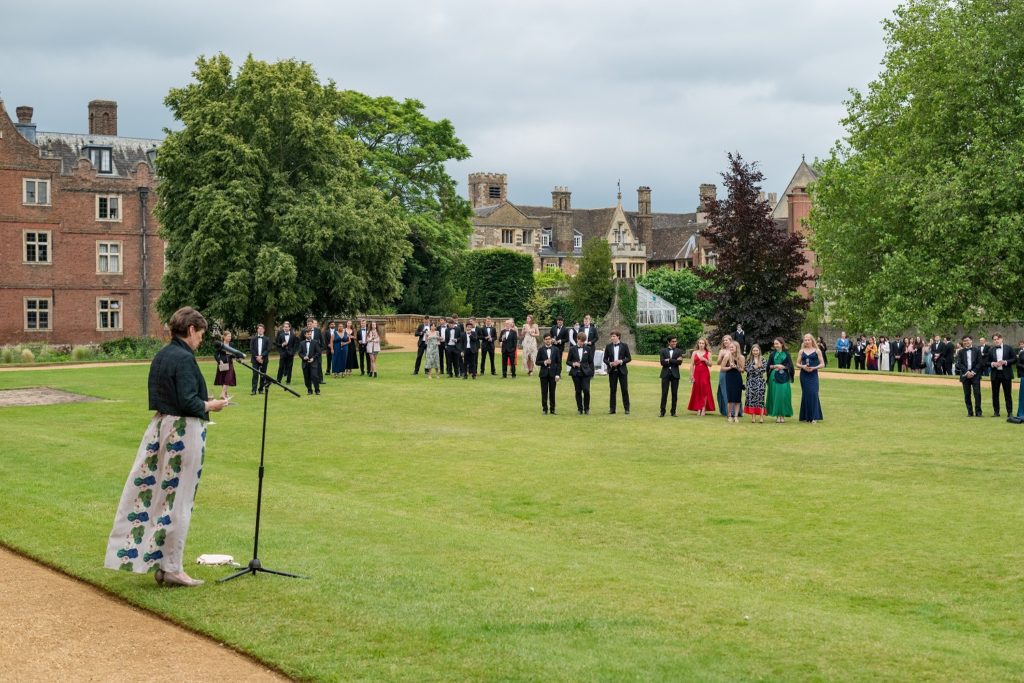
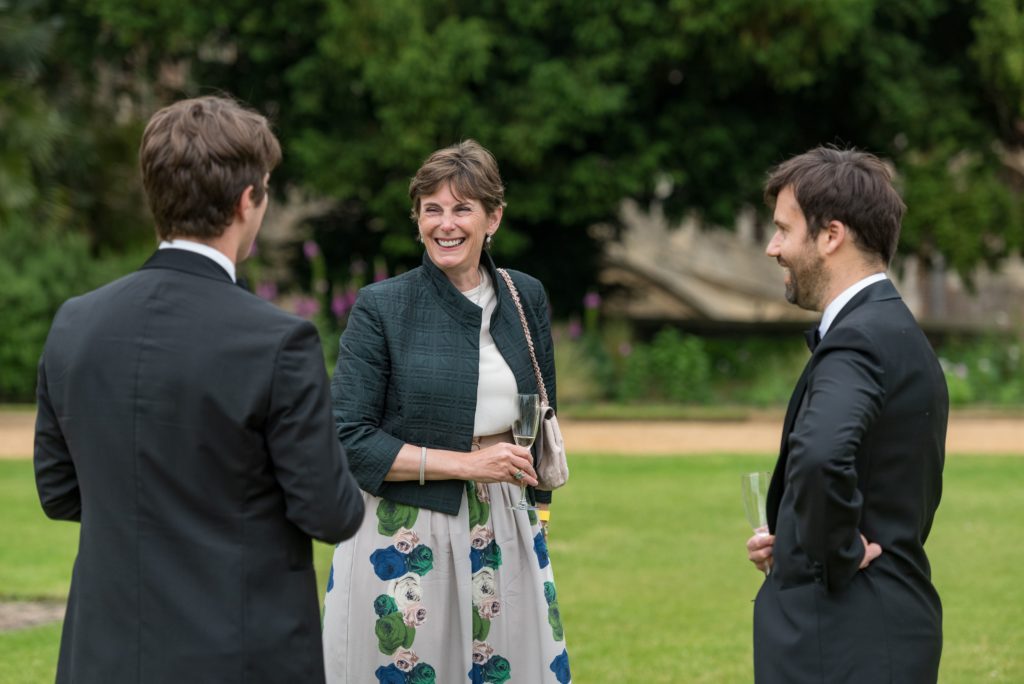
What important changes do you hope to see around the College?
When I worked on the London 2012 Olympic Games, we had a mantra that ‘better never stops’. In the same way, St John’s doesn’t rest on its laurels – there is always something we can do better. We hope to make some major investments across the College, all driven by our aim to sustain and strengthen the sense of community and shared experience. After all, that’s what makes a college so distinctive – it’s a place where we live, work, dine, socialise and relax together. The pandemic drummed this home, if it were needed.
One focus is on providing the best environment for the twenty-first century student and Fellow. It’s an important part of attracting the most talented people to the College and creating the best conditions for their success here. We need more and better space for students to work and for teaching, better accommodation for graduates, and we would love to get back to the principle that undergraduates live within College for their first three years. Investing in the research community in the College is another critical need.
This College has always been a place where you just belong, you don’t have to fit a mould
I’m personally keen that we get more benefit from the College grounds. We’re blessed with a historic 17-acre site. I’d love to enhance our outdoor spaces so that they entice more students into the fresh air and green havens, whether to study, relax or exercise. There’s lots of potential to improve biodiversity, too. Pursuing this would be so good for the health and wellbeing of everyone onsite.
Change doesn’t always have to be new and shiny to make a big impact. In the last year, we’ve reverted to more traditional ways of conducting important College ceremonies. For example, the admission of scholars had changed to become a set piece event in the Chapel in the last decade or so, but we’ve now reinstated the more intimate and atmospheric ceremony in the Combination Room, as dusk falls. Traditions like these are part of the living history of the College, connecting today’s students with their forebears over five centuries in an unbroken thread of scholarship and learning.
What do you hope always remains the same at St John’s?
Joie de vivre. And being a very “college-y” College. Academically we’re strong, but we’re also known for getting involved in so many areas beyond academia. I’m determined that both continue to run in tandem.
St John’s is a meritocracy, where diversity of experience, ideas and culture all enrich academic progress. Our free places plan is part of that continuum; it’s about attracting the best young minds, those with the highest potential to benefit from the rigours of a Cambridge education, and then fully developing their intellectual, social and cultural capital. One of the most important aspects, sometimes overlooked, is that the challenge funding for free places offers this College the rare opportunity of a permanent endowment to guarantee support in perpetuity.
Thinking about our values, I hope that St John’s will always stand for integrity and independence, excellence, fairness, tolerance, honesty. Sometimes, I hear potential students wonder if they will ‘fit in’ at Cambridge. That’s not how we see it. This College has always been a place where you just belong, you don’t have to fit a mould. I hope that’s always true.
There is such a strong sense of stewardship here and of our obligations to future generations of the College to ensure that they enjoy the same freedoms to pursue ideas and scholarship
Not long ago a friend of mine, a distinguished plant scientist who is a Fellow at another college, told me about her daughter, a PhD student in Cambridge. Every time she saw her daughter, my friend heard, ‘Oh, I wish I was at John’s’. Eventually, she asked why. The answer: ‘Everyone at John’s seems happy’. I never want that to change.
What responsibilities does St John’s have to society and to the planet more widely, and how can this best be approached?
St John’s is a place that always has and always will foster advancements in knowledge and understanding, and these benefit all people and the planet.
You can see this in our climate change approach. It’s very easy to make headline statements but look behind those headlines and all too often there’s much less immediate commitment. At John’s we’re clear that the biggest impact we can ever have on this global crisis is through the research life we foster in the College. So, recent Fellowship elections reflect that. We have elected Professor Laura Diaz Anadon, an international leader on climate change policy, and Dr Darshil Shah, a Fellow in Architecture, who is working on new biomaterials, such as natural fibre composites, as alternatives to conventional materials for sectors including energy, construction and healthcare. At the same time, we’ve committed to try to halve carbon emissions from our onsite energy consumption by 2030. That’s a tough call on such a historic estate, which is significantly reliant on gas powered heating. But even if we don’t quite reach 50% within eight years, we’ll have made a very big stride towards it. A team of Fellows are crunching the data and identifying potential, a generous donor is funding a PhD student to ensure the research learning is captured and shared, and we’re using our scale in the city to help overcome the infrastructure challenge. I think this is a great lesson for our students – making a material change takes determined effort, harnessing all our resources, a great deal of focus and some patience to get it right.
There is such a strong sense of stewardship here and of our obligations to future generations of the College to ensure that they enjoy the same freedoms to pursue ideas and scholarship. If we are resolute about that stewardship, and pursue it with integrity, St John’s will always repay the trust that society places in us.
Speaking of academic freedom, the issue of free speech and no-platforming have been prominent in universities recently, how does this affect the College?
From some of the wider coverage of university life, you’d be forgiven for imagining there’s a pervasive, oppressive atmosphere around what one is ‘allowed to say’ in academia. It’s not true here. John’s is tolerant and open-minded. We want the widest range of ideas and perspectives to be openly discussed and debated here – that’s how we teach students to think for themselves and enrich their learning.
This isn’t an area where any of us can be complacent. Once people believe they must be cautious about airing their opinions, confidence in freedom of speech begins to fade. The College is keen to reinforce its commitment to open debate and discussion. In fact, we’ve invited one of the champions of free speech in Cambridge, Dr Arif Ahmed, to a Q&A session with our students on this very subject later this term. I’m looking forward to hearing more there.
You obviously engage with a multitude of alumni in your role, what are some of the priorities they look to you to consider?
I love meeting our alumni, hearing their stories of College life and their deep affection for St John’s. Above all, I’d say our alumni want to be assured that the special nature of the College is being cherished, that the Johnian spirit is alive and well in 2022, and that we’re building the same enduring affinity for St John’s that brings Johnians back to the Great Gate decade after decade.
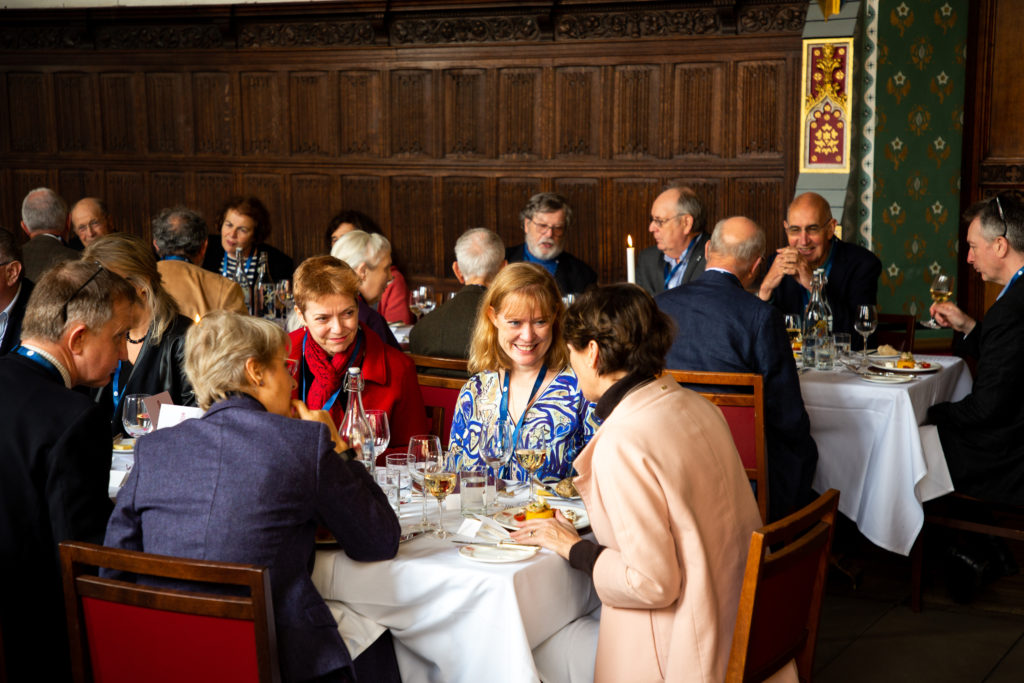
I’m often asked how we’re encouraging students to be bold and brave, to make the most of their time at Cambridge. Alumni want to know that academic progress continues, but also that John’s remains absolutely committed to sport, music and drama as an essential part of College life. Rightly, Johnians want to know that the College continues to draw in top academic talent, that it is well run, that our finances are sound and our independence is protected. Alumni are very concerned about the financial barriers to a Cambridge education in recent years, which is reflected in their outstanding support for studentships and our ambitious free places endowment.
Although you are relatively early in your tenure as Master, have you had any thoughts about what you hope your legacy might be?
Whilst I have the privilege to be Master, I want us to be the standard of excellence for the collegiate model and all the benefits that it can confer. I’ll be using my time and energy to ensure that we attract the most talented people to St John’s and that we accelerate their success here. That way, we can burnish St John’s global reputation for distinguished scholarship and intellectual achievement. And, very importantly, I hope that this College will continue to be a happy place.
I think the matter of any legacy is for others to judge. I hope when my term is up, I might be regarded as the best female Master the College has ever had!
Written by
Heather matriculated at St John’s in 1984 and read Geography/Land Economy. Following senior positions in the public sector and at Deloitte LLP, she chaired the Food Standards Agency. Heather was made an Honorary Fellow of St John’s in 2018 and became the College’s 45th Master in 2020.


